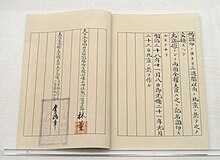Intervention by Shimonoseki
The Triple Intervention, or Shimonoseki Intervention, was a joint intervention by Russia , the German Empire, and France in 1895 with the aim of urging Japan to return the Liaodong Peninsula to China . After the Sino-Japanese War of 1894/95, the Chinese Empire ceded the peninsula to Japan in the Shimonoseki Peace Treaty. On April 23, 1895, the three envoys of Russia, France and the German Reich (represented by the envoy Felix von Gutschmid ) visited the Japanese Foreign Ministry and issued three identical declarations in which Japan was given the "friendly advice" to return the peninsula return to China. Japan was forced to follow this "advice", which was ultimately a barely fooled threat to intervene on the part of China, as it saw no way of resisting the three great powers. For Japan the intervention was diplomatic humiliation and in the years that followed it stepped up armaments efforts to prepare for a possible conflict with one of the European powers.
The intentions of the great powers
Russia
At that time, Russia's East Asia policy was primarily aimed at achieving an ice-free seaport on the Pacific. The Russian interest continued to be the prevention of the Japanese spread on the Asian continent. At first Russia did not find it problematic that Japan would occupy parts of China if it recognized Korea's independence. But the Russian finance minister Sergei Vitte wanted to prevent Japanese mainland acquisition, brought about a strengthening of the Russian fleet in the Far East and decided to allow Russia to participate in an intervention.
German Empire
At that time, the German Reich was also striving for a base in the Far East. Although the Reich had sent a message to Japan on April 6, 1895, according to which it recognized the terms of peace, Chancellor Hohenlohe-Schillingfürst and Foreign Minister Bieberstein proposed cooperation with other great powers with regard to an intervention against Japanese acquisition of territory on the mainland. Kaiser Wilhelm II agreed to the reports of the German ambassador to China on April 8, calling for German participation in an intervention. According to the report, cooperation with Russia should give the German Reich an opportunity to obtain the concession of a naval base from China. Other reasons for the participation of the German Reich in the intervention were the prevention of a further Russian-French rapprochement, the diversion of Russia from Europe to the Far East and the fear of a “ yellow danger ”.
France
For France, the cooperation between Russia and the German Reich was welcome. France had signed an alliance treaty with Russia in 1894 , which is why it also took part in the intervention.
Other great powers
Great Britain, which Russia and the German Reich proposed to participate in the intervention, declined to participate because of public opinion. The US was also pro-Japan and remained neutral.
Diplomatic note
In the notes handed over by the three ambassadors on April 23, 1895, Japan was given the “friendly advice” to renounce the annexation of the Liaodong peninsula, “since the possession of the Liaodong peninsula, which is claimed by Japan, is a constant threat to the The capital of China [Beijing] and at the same time would make Korean independence appear illusory, and thus represent a permanent obstacle to peace in the Far East. "
Reactions from Japan
Faced with the threat of intervention, the Japanese Prime Minister Itō Hirobumi tried to convene a conference with the great powers. However, Foreign Minister Mutsu Munemitsu disagreed with Itō's proposal as he feared further intervention. Ultimately, Japan accepted the “council” of the three powers on May 4th because it could not hope for active support from the USA and Great Britain.
Since 1863 at the latest, Japan had believed that it had good relations with the great Western powers; it was surprised by the 'triple intervention'. This discredited notions of international harmony among the Japanese public and replaced them with ideologies of heroic effort and willingness to fight. In the following years Japan continuously upgraded its armed forces .
Result
In the next few years the great powers received smaller territories from China than leased areas. B. Tsingtau on the Shandong Peninsula.
literature
- Christian W. Spang, Rolf-Harald Wippich (eds.): Japanese-German relations, 1895–1945. War, Diplomacy and Public Opinion (= Routledge Studies in the Modern History of Asia. Vol. 35). Routledge, London et al. 2006, pp. 65 ff., At google books .
Individual evidence
- ↑ a b Aleš Skřivan, Sr., Aleš Skřivan, Jr .: Great Powers and the Sino-Japanese War 1894–18951 . In: Prague Papers on the History of International Relations . No. 2 , 2015, p. 16–44 (English, online ).
- ^ WL Langer: The Diplomacy of Imperialism 1890-1902 . 2nd Edition. Knopf-Verlag, New York 1951, p. 186 (English).
- ↑ Jürgen Osterhammel : The Metamorphosis of the World: A History of the 19th Century , 5th Edition 2010, p. 710 f. ( online )

